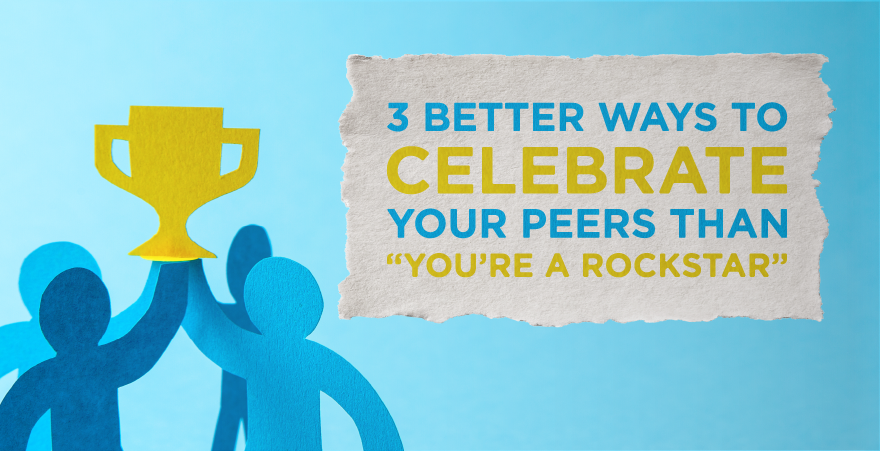You just nailed it. Months of research, preparation, and draft after re-draft have just culminated in what was certainly the greatest presentation of the millennia.
After the thunderous applause begins to peter off, you are finally able to hear the congratulations that you’ve anticipated for so long:
“You’re a rockstar!”
“Hey, rockstar!”
“You know what you are? A total rockstar.”
You’re confused. Images of strange people with heavy facepaint and mangled hair flood your mind. A rockstar? What about the presentation? What about the takeaways?
Though this scenario is a little hyperbolic, the term ‘rockstar’ has been so overused by the corporate sphere that it’s lost sincerity. In a profession where celebration can be the difference between motivation and stagnation, celebrating others effectively is critical.
People Need to be Celebrated
It’s no secret that fulfillment and productivity are linked. In fact, Abraham Maslow’s hierarchy of needs, one of the widely accepted tenants of psychology, argues that people need fulfillment and validation before they can sculpt their best work.
So, if you’re an individual that would like to achieve more, or a leader that would like to see increased performance from your teammates, then feeling valued is an essential.
And the occasional use of “you’re a rockstar” won’t cut it.
But, just as much as priority management or focus is a learnable skill, celebration is an attribute that should be practiced to master.
To aid you in helping others and yourself feel more valued, here are three ways to celebrate your peers other than calling them a “rockstar.”
-
Make your compliments very specific.
There is a correlative relationship between how meaningful a compliment is, and how specific the compliment is. Before offering a compliment, consider these two questions:
- What did you feel was particularly impressive about their accomplishment?
- Why did you find their accomplishment so impressive?
Your response to these two questions will always yield a meaningful compliment.
For example, if your friend just made a slam-dunk of a sales pitch, you could say,
“Your confidence in that call was tangible! [What] I’m trying to develop better confidence myself, so you’re example was helpful to observe. [Why]”
Can you imagine receiving a compliment like this? As long as your head doesn’t get too big, you’d be able to hold it high for a week!
-
Ask questions.
Some of the highest compliments don’t need to be explicitly expressed—they can be asked.
In Ronald D. Vales’ exceptional article written to the University of Virginia, Vale observes, “Pursued properly, a good question [is] an excellent vehicle with which to start a process of inquiry.”[1]
By inquiring for more information about an accomplishment through questioning, a certain level of investment is implied. This genuine interest is enormously flattering.
Just imagine!
After winning a significant race, you have two friends approach you. One states that you’re a talented runner, and leaves the conversation at that point. Another begins to ask you about your training regimen, what your diet looks like, and how long it took to attain such a level of performance. Which individual do you feel more validated by?
-
Implement or emulate their accomplishment!
Famed American author Pat Conroy once made this seemingly controversial observation, “Every athlete learns by theft and mimicry.”
Such a statement can initially seem to be pessimistic, but originality stands on the shoulders of emulation. Only after learning the greatest techniques can we pioneer them further.
This being said, it can be fairly argued that emulation is the greatest compliment one can give. To emulate is to recognize the tremendous value of another’s accomplishment, even to the point striving for them.
By emulating another’s accomplishment, we can say that our lives have been changed because of another.
And there’s no greater compliment than a changed life.
###
[1] Vale, R. (2013, March). The value of asking questions. Retrieved March 23, 2021, from https://www.ncbi.nlm.nih.gov/pmc/articles/PMC3596240/



